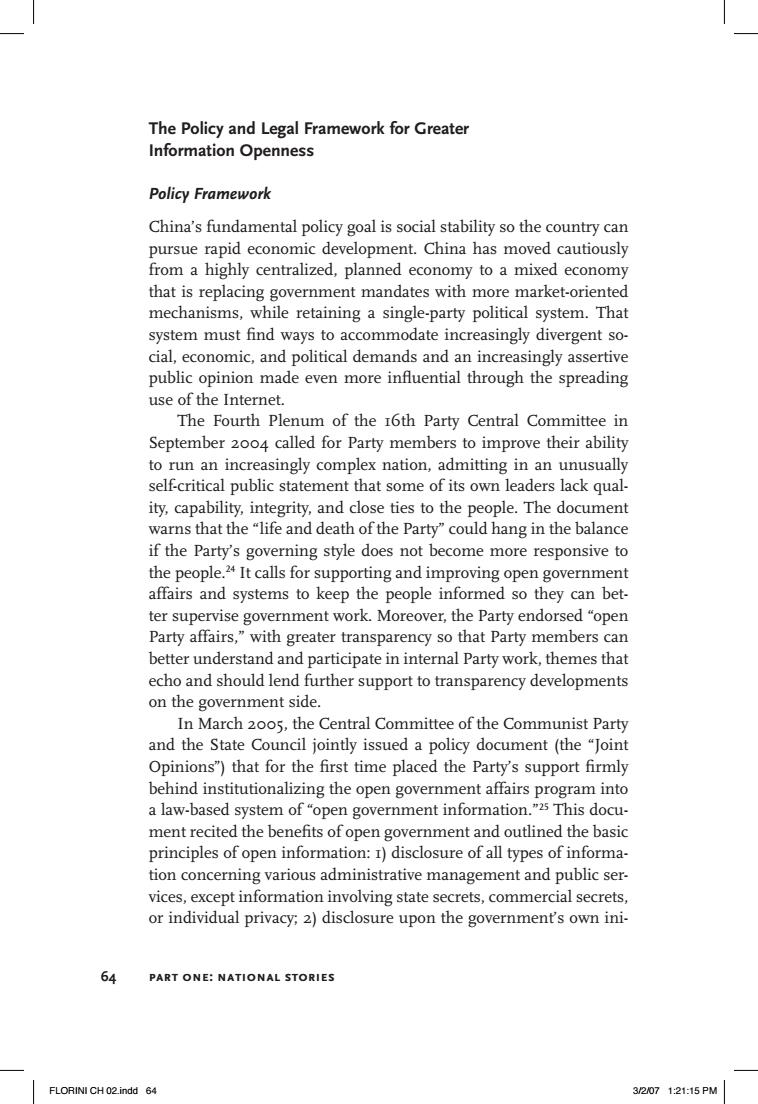正在加载图片...

The Policy and Legal Framework for Greater Information Openness Policy Framework China's fundamental policy goal is social stability so the country can pursue rapid economic development.China has moved cautiously from a highly centralized,planned economy to a mixed economy that is replacing government mandates with more market-oriented mechanisms,while retaining a single-party political system.That system must find ways to accommodate increasingly divergent so- cial,economic,and political demands and an increasingly assertive public opinion made even more influential through the spreading use of the Internet. The Fourth Plenum of the 16th Party Central Committee in September 2004 called for Party members to improve their ability to run an increasingly complex nation,admitting in an unusually self-critical public statement that some of its own leaders lack qual- ity,capability,integrity,and close ties to the people.The document warns that the "life and death of the Party"could hang in the balance if the Party's governing style does not become more responsive to the people.2 It calls for supporting and improving open government affairs and systems to keep the people informed so they can bet- ter supervise government work.Moreover,the Party endorsed "open Party affairs,"with greater transparency so that Party members can better understand and participate in internal Party work,themes that echo and should lend further support to transparency developments on the government side. In March 2005,the Central Committee of the Communist Party and the State Council jointly issued a policy document (the "Joint Opinions")that for the first time placed the Party's support firmly behind institutionalizing the open government affairs program into a law-based system of "open government information."25 This docu- ment recited the benefits of open government and outlined the basic principles of open information:I)disclosure of all types of informa- tion concerning various administrative management and public ser- vices,except information involving state secrets,commercial secrets, or individual privacy;2)disclosure upon the government's own ini- 64 PART ONE:NATIONAL STORIES FLORINI CH02.indd 64 3/2071:21:15PM64 part one: national stories The Policy and Legal Framework for Greater Information Openness Policy Framework China’s fundamental policy goal is social stability so the country can pursue rapid economic development. China has moved cautiously from a highly centralized, planned economy to a mixed economy that is replacing government mandates with more market-oriented mechanisms, while retaining a single-party political system. That system must find ways to accommodate increasingly divergent social, economic, and political demands and an increasingly assertive public opinion made even more influential through the spreading use of the Internet. The Fourth Plenum of the 16th Party Central Committee in September 2004 called for Party members to improve their ability to run an increasingly complex nation, admitting in an unusually self-critical public statement that some of its own leaders lack quality, capability, integrity, and close ties to the people. The document warns that the “life and death of the Party” could hang in the balance if the Party’s governing style does not become more responsive to the people.24 It calls for supporting and improving open government affairs and systems to keep the people informed so they can better supervise government work. Moreover, the Party endorsed “open Party affairs,” with greater transparency so that Party members can better understand and participate in internal Party work, themes that echo and should lend further support to transparency developments on the government side. In March 2005, the Central Committee of the Communist Party and the State Council jointly issued a policy document (the “Joint Opinions”) that for the first time placed the Party’s support firmly behind institutionalizing the open government affairs program into a law-based system of “open government information.”25 This document recited the benefits of open government and outlined the basic principles of open information: 1) disclosure of all types of information concerning various administrative management and public services, except information involving state secrets, commercial secrets, or individual privacy; 2) disclosure upon the government’s own iniFLORINI CH 02.indd 64 3/2/07 1:21:15 PM